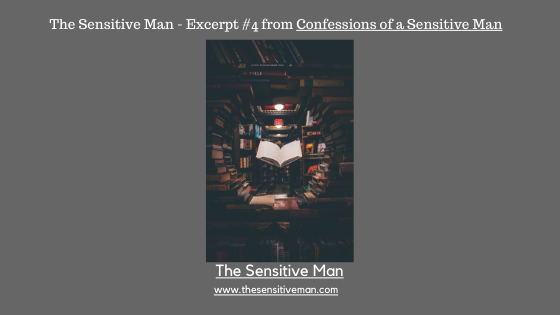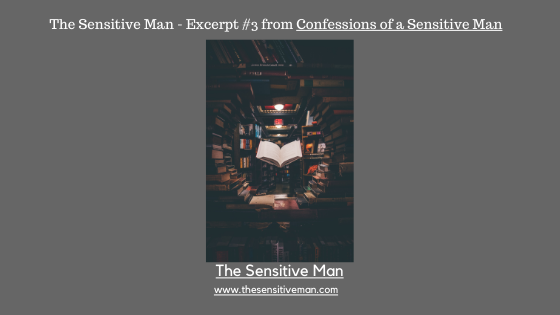|
A Blog about Sensory Processing Sensitivity from the Worldview of a High Sensing Male
For the next eight to ten weeks, I am going to be providing excerpts from my upcoming book, Confessions of a Sensitive Man, An Unconditional Defense of Sensitive Men. I am anticipating a release date on Amazon, et.al., sometime in late September. Please enjoy this free preview of the book. From Chapter 4 – Common Traits and Characteristics of Highly Sensitive Males HSPs are often labeled as sensitives, those who can gain nuanced information from the environment simply by showing up and paying attention. But what exactly does that mean? Think back to the idea of the depth of processing. The sensory information that HSPs receive is largely the same data input as anyone else, HSP or not. Our eyes aren’t bigger, our ears aren’t better receivers, our skin doesn’t have more sensory cells, our taste buds aren’t fatter, our noses aren’t olfactory blessed. We receive the same inputs as the general population does. The deciding factor is the way this data gets filtered and processed. Our brains are wired to take data inputs and process them more thoroughly, passing many times through a process that gleans the maximum amount of information per packet. Our eyes don’t see any better than others, but our brain processes the small fly on the wall that no one else notices. Body language is processed through sight and memory to discern that someone is not happy, but is not revealed in their outward demeanor. We smell the strong perfumed woman in the room twenty feet away, because we register the annoyance of the strength of the application of the perfume. We detect the music is too loud, because our processing of sound does not allow us to filter out the exceeding thumping of the bass line in the music. You could surmise that our filters are triggered at a lower threshold than others. If so, then we notice more in a quick cursory scan of the environment. The subtle taste of too much salt in an hors d’oeuvre that offends our tongue may go unnoticed by another who simply ignores the discrepancy. The scratchiness of the starched shirt we are wearing becomes annoying over time because we can’t easily shut off the sensory processing. This does not mean we suffer from over sensory input or hypersensitivity, but that our processing of the sensory input gets processed over and over to the point where it can become an annoyance. Even so, that ability to process deeply the information we receive can be a source of intuition and insight. Seeing the nuanced or noticing the subtle makes it easy to infer the detail of a situation and see things that others don’t. This is the source of much creativity and why so many creative people are highly sensitive people. The effects on emotions and intelligence can be profound. A mood can change in a flash, simply because of noticing something in the environment that is irritating or troubling. The subtle texture of our world can be a source of newfound inspiration or the source of emotional pain. To see the subtle aspects, the fine details of the world, can certainly enhance the intelligence of the individual, especially if there is an emotional charge to what is seen. I think this is why so many HSPs are perceived as being more intelligent. It isn’t about raw processing power or the ability to discern logical solutions to problems, but rather a way of sensing one’s way around the environment, picking clean the leftovers that others pass by, the small details that in some cases can be life or death. It then becomes encoding and storing the knowledge for later use. It is with the deep processing that this stored data becomes valuable at a later date. Good memory aided by strong emotional coding. This is where the value add is for this characteristic; the ability to learn from the subtleties of life and not leave behind any useful data, to gather every stone and turn them until they are polished nuggets of knowledge. This is a very slow, deliberate process. This is why HSPs are not quick decision-makers. The decisions they make are often full of insight and provide a big-picture vision that detail decision-making with its raw churning of information may miss. Now I don’t want to paint a brushstroke so broad that it appears all HSPs are intuitive gurus who are always accurate about conclusions. They are not. Intuition can only go so far, and sometimes internal biases can color the outcome regardless of the input. Energized emotion or fatigue can factor into discoloring the insights, perhaps distorting the obvious, with personal prejudices. As always, our senses can fool us, and regardless of how sure we processed the input accurately, we can be off the mark as much as non-HSPs. Being the conscientious creatures we are, we may back off with our intuitions if they are proven to be inaccurate. Confidence can wane without some reinforcement from the external world. I see this trait as a valuable part of the HSP profile. It should be encouraged, not discouraged. When there is inaccuracy, we should chalk it up to the absolute uncertainty of any thought outcome, and that our conclusions are either inaccurate for the moment, spot-on, or ahead of our time. Coming to conclusions is often an iterative process; each stroke of the wheel brings you closer to accuracy; one conclusion leads to another until a consensus is gained. Many HSPs don’t recognize the value of this nonstandard intelligence we possess. It is complementary to the logical, deductive reasoning of the twenty-first century, which is focused on the following of a specific format and hard grinding out of solutions. HSPs tend to snatch things out of the blue and place them in order, creating new thoughts and patterns. It is a process that allows us to look up from the desk and see out the window, sensing and feeling our way to intuitive solutions, ones that can never be seen without lifting one’s head.
0 Comments
A Blog about Sensory Processing Sensitivity from the Worldview of a High Sensing Male
For the next eight to ten weeks, I am going to be providing excerpts from my upcoming book, Confessions of a Sensitive Man, An Unconditional Defense of Sensitive Men. I am anticipating a release date on Amazon, et.al., sometime in late September. Please enjoy this free preview of the book. From Chapter 3 –Being Different Growing Up: Rising to the Top As was often the case with me, I didn’t fit in well. I tried hard to conform outwardly, but never quite managed to internalize those changes. I felt I lived the life of an imposter. There was much incongruity of who I was and what I presented to the world. Around friends, the neighborhood kids, I was much more confident. These interactions were more one-on-one, and I selected my friends carefully. As my family settled in to the neighborhood in South Carolina, where I grew up, I gained a newfound sense of confidence in who I was. I found that I was a natural leader and organizer. Our neighborhood was almost a frame right out of The Little Rascals. We organized baseball, football, and basketball games with other neighborhoods. I found myself being the one everyone came to find out what was going on. We built campgrounds in the woods, organized campouts with the neighbor kids, and generally had idyllic summers. I was the one doing the organizing, and I liked that role. At one point, I decided to create a neighborhood newsletter and received a student style typewriter where I crafted stories. The next-door neighbor’s mother was a school teacher, who mimeographed the newsletter so we could distribute them. Yes, in the right circumstances and with a certain comfort level, I could easily rise to the top. I was a likable, smart kid and believed in the team concept, yet appreciated my friends as individuals. I was well organized and great planner for the neighborhood. I never realized that these characteristics were natural talents. I just never received the right feedback. In school plays, I was always chosen to be the play’s narrator, usually the first kid out in costume, reciting my lines nervously, but flawlessly. If the costumes were dorky, I got the first laugh, which, of course, was embarrassing for me. One year, we performed a play about George Washington and the founding fathers. I walked out in front of the curtain to start the show, with a quick narration about the subject matter, sporting a concocted wig made of cotton balls that, by the time the play had started was beginning to disintegrate. I was tall and skinny and must have looked ridiculous because the audience burst out in laughter when I walked to center stage. Yet, somehow, I managed to execute on my lines and exit red-faced but relieved. My good memory and my conscientiousness were showing. Perhaps that was why I landed the same part every year. I had a very good sense of humor, a family trait, one that my father shared with us. When I was around familiar company, I could do some spot-on impressions, voices, and characters that made my friends laugh. This was very encouraging. I had a knack for parody and loved to watch comedians on television. My favorites—and inspirations—were Jonathan Winters, George Carlin, and Bill Cosby (before the troubles). I loved to watch oddball shows like Get Smart and Green Acres; it seemed the more absurdist the comedy, the better for me. When Laugh-In came on in the late sixties, it was the sole reason I never went beyond First Class Scout. I quit going to Scout meetings because they were in the same time slot as Laugh-In. There is much to be said for a good sense of humor. I think it can be one of the best redeeming qualities for a sensitive boy/man. Our keen sense of observation can aid us in adding layers of texture to our humor. I believe the best comedians are all sensitive people. There is some ironic and dramatic underlying reason that HSPs put themselves out there for criticism, just to present their quirky view of life. Brave souls, all of them. |
AuthorBill Allen currently lives in Bend, Oregon. He is a certified hypnotist and brain training coach at BrainPilots.com. He believes that male sensitivity is not so rare, but it can be confounding for most males living in a culture of masculine insensitivity which teaches boys and men to disconnect from their feelings and emotions. His intent is to use this blog to chronicle his personal journey and share with others. Archives
July 2024
Categories
All
|



 RSS Feed
RSS Feed
